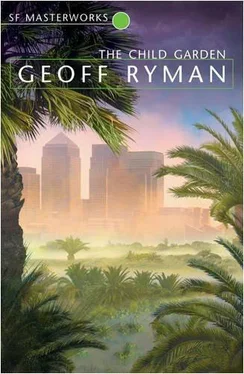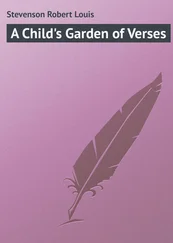The Postperson was a woman. She sat on a tiny chair, with her knees pressed together. Her head was wrapped in a kerchief. ‘That’s fine,’ murmured Milena. The Minister held out a hand for her to sit on a large, upholstered chair.
… died on March 14, 1883.
As Milena settled into it, she felt herself enfolded and cushioned by something else, something that supported her and made the room go still.
Like an ear clearing of air pressure or an infection, her mind was suddenly quiet. Heather was gone. Milena was well. There was a hush all around her like a pond.
Outside the big window, everything was blue and hazy. The last of summer, the first of autumn, a jumble of old buildings. Milena could hear voices and horses’ hooves below, as life was made and unmade in ignorance of what was going on behind this one high pane of glass on the top floor of the Zoo. The window was shaded, its frame was supported, by bamboo.
And Milena remembered. The bamboo reminded her of something.
Ice cream sticks.
She remembered that ice cream had come on little bamboo sticks. She saw the bamboo sticks very clearly. They were in sunlight, on a table. There were children with her, little girls, and they were laying out their bamboo sticks to make a picture. They were making a picture of a house.
Milena was making a window.
She saw it so clearly, it was as if the table, with the sticks, was just around some corner, to be found again.
Memory.
Milena heard footsteps in the corridor below. Very slowly, her attention turned to what was around her. She heard a hissing. It was the hissing of molecules of air against her eardrums. Milena was in the silence.
In the silence, nothing was fragmented. There were no separate strands to gather together, to fumble, to compete for attention. In the silence, all of that fell away, and there was only what was here, and what was to be done.
It was as if she, Milena, had finally come into the room and sat down beside her.
‘I am told that you have been missing performances, Ms Shibush.’
Milena saw no reason to reply. Zookeeper.
‘That cannot help your career,’ the Minister said, gently.
‘Nothing could help my career. I am a very bad actress,’ said Milena.
His eyebrows rose and he shifted in his chair and smiled, amused.
‘What do you think of Ms Patel’s music?’ asked Milena.
‘Personally,’ he said, ‘I thought it showed promise. But what I think is of little importance. It may surprise you to learn that we consulted the Consensus on this matter.’
Nothing seemed to surprise Milena. ‘And?’
‘The Consensus is an extraordinarily accurate predictor of the success or failure of an artistic endeavour. It had a complicated response to Ms Patel’s music. But then all its reactions are complicated. It has all of us inside it.’
But not me, thought Milena. It does not have me.
‘Essentially, it liked it, but its more musically adept personalities registered concern over the roughness of what was shown.’
‘Not surprising,’ said Milena. ‘They were shown what Jacob and I could remember of the pieces. They need work.’
‘Exactly,’ said the Minister. ‘There were other problems.’
Milena waited. There was a silence. The Minister’s smile widened and he chuckled. He was beginning to find the interview disconcerting.
‘There does seem to be a balance in life. We have gained in knowledge and order. But that calm and that wealth of information do not lead us to originality. Out of the disorder of this poor woman’s life, something new has come. So.’ He leaned forward, ‘do we as good immaterialist socialists advise that people should live in disorder and ignorance?’
Rolfa? Ignorant? You ignorant man, thought Milena. Aloud, she answered: ‘I think we advise a love of beauty from whatever source.’
‘Even from the Genetically Engineered?’
‘Of course,’ said Milena, engulfed in calmness. ‘We believe that they are human even if they say they do not. We don’t have to tell anyone that she is Genetically Engineered. We can accept her and her work as being human.’
The Minister chuckled again. ‘We cannot do that, you see, without disrupting our wider and quite delicate relationship with the GEs. They do not wish to be defined as being human.’
‘So what we are really talking about is mining in the Antarctic’
The Minister’s smile did not change.
‘I’ve talked to her sister. The Bears are willing…’
‘Please,’ interrupted the Minister, giving his head a little shake of distaste. ‘Don’t call them that.’
Mining and a market for luxury goods, Milena decided. Where, she wondered, am I getting all of this from?
‘The hierarchy of the GEs don’t know that Rolfa is with us. Her immediate family have agreed to keep it from them. It is in their interests to keep it from them. If we pretend that the author of this music is a human being, they will. They have given us a year to do something with her music. They love her that much.’
The Minister corrected her. ‘Well, we have had a representation from her father asking us to return her if she has been found.’ He corrected her, but was still willing to be generous. ‘We did try to return her. We tried to find both of you and no one here would tell us where you were.’ His smile went crooked with amusement. ‘Which told us that if our own people were so intent, perhaps we did not wish to act. Our relationship with the GEs is delicate but not close.’
He’s amused for now, thought Milena, but I mustn’t get too clever.
‘Thank you, thank you very much,’ she said.
I get this, she decided, from my father. From my political mother and father who dealt this way for years. And I also get it from Heather.
‘Did you know she stole from her family?’ the Minister asked.
‘No,’ lied Milena, sounding shocked.
‘Whatever we do must reflect credit on the immaterialist programme, and on Consensus politics. Your friend has had a capitalist upbringing. She will suffer from grave distortions of personality.’
Milena began to get angry. The Minister kept on talking.
‘It is not only that we will have to keep her shaved, or sitting down so she looks smaller.’ The Minister was smiling, confident that he was talking to Milena on her own level. ‘We have no guarantee that Ms Patel’s behaviour will be acceptable. What we must avoid is making any link in people’s minds between talent and childish behaviour.’
‘I agree of course,’ said Milena. ‘But her upbringing has not been capitalist. It is inaccurate to call the GEs capitalists. Capitalists take the surplus value created by other people’s labour. The GEs do all the work themselves. They may amass wealth and live outside the Consensus, but their Family is in fact a classic example of the Estate system as described by Chao Li Song.’
Oh. The Zookeeper’s face was as blank as a nail hit on the head.
‘That is why their economic activity is able to mesh with ours,’ said Milena. ‘Are GEs immune to the viruses?’
‘Yes… unless.’ The Minister made a vague gesture.
So, thought Milena. There is an unless. They can cure Polar Bears, they just choose not to. Of course they can cure them, lower their body temperature, suppress the immune system…
‘She is so talented. There must be some way,’ said Milena.
‘We will give it thought,’ he promised.
‘If she joined the Consensus, was considered human, she could use the practice rooms, take instruction…’
‘Of course,’ he said.
Come on, come on, follow it through. Milena kept her hands still.
He looked wary. ‘Of course, if she joined the Consensus…’ he mused. ‘We could correct for all of that. We could ensure that there would be no bad behaviour. And it would be a shame… it would not be just… if such talent were allowed to wither. All right. We will consider that aspect.’ He leaned back. The interview was over.
Читать дальше












